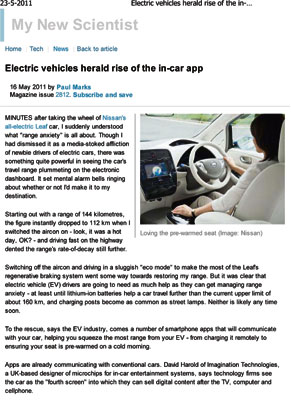‘The emergence of the electric car is leading to a suite of smartphone add-ons,’ writes New Scientist (14 May 2011). IDE researcher, Dr Sacha Silvester, agrees and adds: “Apps are crucial to compensate for the limited range.”
The New Scientist article describes how the app for the full-electric Nissan Leaf recalculates your route and gives feedback on your driving style depending on the life left in the batteries and the mileage left to travel. And that’s not all. Drawing on a host of original ideas, apps will also help you plan your trip and navigate you through the hazards of running out of power by a host of original ideas, most of which couldn’t exist without mobile information technology.
TU alumnus, Crijn Bouman (MSc), knows what it’s like to see your travel range plummeting. He is the founder of the company Epyon, which develops fast battery chargers for electric cars, and drives a Nissan Leaf himself. “We’ve calculated that if you fully turn on the air conditioner, you’re using 2 kilowatt. This reduces your travel range with 10 to 15 percent.” Bouman has an app on his smartphone that allows him to cool his car while it is still charging. “I haven’t used it yet, but in the summer I surely will.”
Silvester, researcher at electric transport centre D-incert, thinks smartphone apps are necessary in trip planning: “It helps you make the planning based on the current charge; it knows where you can recharge and it can book a charging point for you at the destination.” Silvester says a peer-to-peer network is emerging with people who own a private charging point, but who want to make it publicly available to other e-drivers as well. An app can bring such people together and settle the accounts.”
Bouman believes that in electrical transportation the challenges lie especially in the information technology, more so than in hardware technology. “Electric cars are like computers on wheels”, he says. “Apps and smartphones go very well together with them; they add to the high-tech feeling it is to drive electrical cars. Especially during the early stages, when recharging stations are scarce, apps can play an important role. Apps can help you to avoid running out of power, as they will tell you where to recharge your batteries. They make it more easy to employ the car in your daily life.”
The rechargers that Epyon develops are all connected with one another via internet and are also able to communicate with smartphones. They recharge a battery to up to 80 percent in 15 to 30 minutes. “At the moment, a company is developing an app that will allow you to follow the recharging process on your smartphone,” says Bouman. “That way, while you’re sitting in the cafeteria of the fuel station you’ll know whether you have time to drink another cup of coffee or not. I think the app business for electrical cars will become booming.”
“People will have to adapt their lifestyle to the electric cars,” Silvester believes, and this starts by coping with longer stops at recharging stations (as compared to gas stations). But far from being a nuisance, such electric charge shops could develop into temporary offices, in which you take a desk, get online and continue your work while your batteries get topped up. Silvester can imagine that such walk-in offices will flourish.
Van de Aula wordt de komende periode ook een deel van de dakbedekking vernieuwd. Lassche voorziet dat beide klussen zeker voor het begin van het komende collegejaar klaar zullen zijn.



Comments are closed.